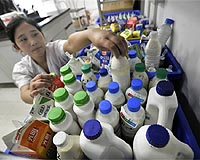 |
Taipei (AFP) March 25, 2011 Taiwan on Friday imposed a ban on food imports from five Japanese areas near a quake-damaged nuclear power plant due to radiation concerns. The ban, which takes effect immediately, covers food items from Fukushima, where the plant is located, and four other areas nearby, said Wang Jet-chau, a health department spokesman. "We will continue monitoring the situation in Japan and might extend the ban if it gets worse," he said. A nuclear power plant in Japan's Fukushima prefecture was critically damaged in the March 11 earthquake and tsunami. The move came after the government Thursday detected radioactive particles on a batch of clams imported from Japan. Earlier, a shipment of Japanese fava beans had also been found to be slightly contaminated. Taiwanese officials have assured the public that radiation found on both shipments was within safety limits but the tainted products would be destroyed. Many of the island's Japanese restaurants and supermarkets have put up notices stressing that their products were imported prior to the quake and safe to eat. The Matsusei supermarket chain on Friday kicked off a previously planned special promotion of instant noodles and other dried goods from Japan, saying it anticipated strong demand. "Sales temporarily dropped when news of tainted food came out but they came back up soon as customers want to stock Japanese products that might be in short supply soon," said company official Cohen Tang. Taiwan follows Russia, Australia, Singapore, the United States and other countries in restricting food imports from Japan amid growing concern over food safety. The anxiety was compounded by the Tokyo government's revelation Wednesday that radioactive iodine in the drinking water was more than twice the level deemed safe for infants, although it remained within safe adult limits. Japan's government has also halted shipments of untreated milk and vegetables from Fukushima and three adjoining prefectures, and stepped up radiation monitoring at another six, covering an area that borders Tokyo. Earlier this week, Taiwan started radiation tests on letters and parcels from Japan while so far none were found to be contaminated. Also Friday, a rare drill simulating a tsunami and an ensuing nuclear disaster was staged in New Taipei city in the island's north. President Ma Ying-jeou stressed that disaster prevention was better than disaster relief while inspecting the drill, which saw rescuers attempt to save lives in houses and cars ravaged by simulated tsunamis. Anti-nuclear sentiments rose in Taiwan after the Japanese disaster, with more than 2,000 people rallying on Sunday to demand the government stop building a new nuclear power plant. Several recent polls also found that a majority of Taiwanese were worried about the safety of the island's three atomic energy facilities, which generate about 20 percent of overall power supply. Taiwan, like Japan, is in an earthquake-prone part of the Pacific basin.
earlier related report The announcement means imports of fruit and vegetables from the entire Kanto region, a large area including greater Tokyo, are banned to the city-state. "Radioactive contaminants have been detected in another two samples of vegetables from Japan," the Agri-Food and Veterinary Authority of Singapore (AVA), the country's food regulator, said in a statement. "In view of the latest developments, the Agri-Food and Veterinary Authority will extend its suspension on the import of fruits and vegetables to include the prefectures of Kanagawa, Tokyo and Saitama," it said. The AVA said radioactive contaminants were detected in cabbage samples from Kanagawa and in leek samples from Tokyo that reached the city-state on Friday and Saturday. "This means the entire Kanto region of Japan is now suspended from exporting fruits and vegetables to Singapore as AVA had earlier suspended the Kanto prefectures of Ibaraki, Tochigi, Gunma and Chiba," the AVA said. A global food scare is spreading as a result of severe damage to a nuclear power plant in Fukushima prefecture following the March 11 quake and tsunami that have left more than 27,000 dead and missing in northeastern Japan. China, Russia, Australia, Singapore, the United States, South Korea and Taiwan have all restricted imports of certain foods from affected regions and stepped up monitoring of food imports from other parts of the country as a precaution. The quake has become Japan's deadliest natural disaster since the 1923 Great Kanto Earthquake, which killed more than 142,000 people. Hundreds of thousands of people have been displaced from their homes and taken shelter in emergency facilities. Radiation levels have surged in seawater near a tsunami-stricken nuclear power station in Japan, officials said Saturday, as engineers battled to stabilise the plant in hazardous conditions.
Share This Article With Planet Earth
Related Links Farming Today - Suppliers and Technology
 Putting Food Scares Under The Microscope
Putting Food Scares Under The MicroscopeBelfast, UK (SPX) Mar 25, 2011 As the increasing number food scares causes consumers to question the safety of everyday food items, researchers at Queen's University Belfast have completed the first ever analysis of all the food recalls announced in the USA, UK and Ireland over the last decade. The research, by Dr Antony Potter at Queen's Centre for Assured and Traceable Foods (ASSET) identified 2,439 food recalls over ... read more |
|
| The content herein, unless otherwise known to be public domain, are Copyright 1995-2010 - SpaceDaily. AFP and UPI Wire Stories are copyright Agence France-Presse and United Press International. ESA Portal Reports are copyright European Space Agency. All NASA sourced material is public domain. Additional copyrights may apply in whole or part to other bona fide parties. Advertising does not imply endorsement,agreement or approval of any opinions, statements or information provided by SpaceDaily on any Web page published or hosted by SpaceDaily. Privacy Statement |